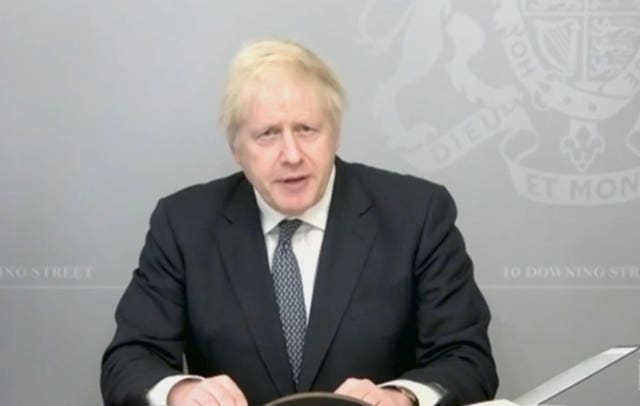PM sets out £16.5bn of defence spending as space command and AI agency planned
Boris Johnson said the extra funds are needed to modernise the UK’s capabilities and end an ‘era of retreat’.

Boris Johnson has set out a £16.5 billion increase in defence spending over four years as he said the UK faces a “perilous” period for global security.
The Prime Minister told MPs the UK will once again become Europe’s leading naval power, the RAF will get new hi-tech jets and the military will be modernised.
The plans include the creation of an agency dedicated to artificial intelligence, and a “space command” capable of launching the UK’s first rocket by 2022.
A National Cyber Force, combining intelligence agencies and service personnel, is already operating against terrorists, organised crime groups and hostile states, the Prime Minister confirmed.
Mr Johnson suggested that in future, a soldier in hostile territory would be “alerted to a distant ambush by sensors on satellites or drones”, with artificial intelligence helping devise the best response which could involve an air strike, an assault by a swarm of drones or a cyber-attack.
Warships and combat vehicles could be equipped with “inexhaustible” lasers to take on opposing forces, Mr Johnson suggested, with no prospect of them running out of ammunition.
The announcements were billed as the biggest increase in defence spending since the Cold War and form part of a wider review of the UK’s foreign policy and security objectives which will now not be published until next year.
Mr Johnson said that for decades, successive governments have “trimmed and cheese-pared” defence budgets, risking the future viability of the Armed Forces.
The plans set out by Mr Johnson will see the UK spend more on defence than any Nato member except the US.
Setting out the reason for the multi-year settlement, Mr Johnson told the Commons: “The international situation is now more perilous and intensely competitive than at any time since the Cold War.
“Everything we do in this country – every job, every business, even how we shop and what we eat – depends on a basic minimum of global security.
“Our people are sustained by a web of lifelines, oxygen pipes that must be kept open – open shipping lanes, a functioning internet, safe air corridors, reliable undersea cables, and tranquillity in distant straits.”
Measures set out by the Prime Minister, who addressed MPs remotely as he continues his period of coronavirus self-isolation, include:
– Restoring the UK’s position as the “foremost naval power in Europe”, including the deployment of aircraft carrier HMS Queen Elizabeth to the Mediterranean, Indian Ocean and East Asia next year.
– Reshaping the Army for an age of “networked warfare” and strengthening the capabilities of special forces.
– A £1.5 billion investment in military research and development.
– A new fighter system for the RAF, using artificial intelligence and drone technology to “defeat any adversary in air-to-air combat”.
Mr Johnson said the increase in defence spending is necessary to ensure the UK’s place on the global stage.
“Extending British influence requires a once-in-a-generation modernisation of our Armed Forces and now is the right time to press ahead,” he said.
Taking advantage of new technology, while acting speedily to “remove or reduce less relevant capabilities”, will transform the UK’s capabilities.
Mr Johnson said the announcements mark the end of an “era of retreat” and could help create 10,000 jobs a year.
His remarks will come as a relief for military chiefs, who have been pressing for a multi-year settlement to enable them to plan effectively for the future.
Despite reports of reluctance to make the commitments in the Treasury, Mr Johnson insisted both Defence Secretary Ben Wallace and Chancellor Rishi Sunak “believe in this as fervently as I do”.

His plans mark the first phase of the Government’s integrated review of the UK’s foreign, defence, development and security policy, with the final conclusions due to be unveiled next year.
There has been speculation the aid budget will be slashed from 0.7% of national income to 0.5% in next week’s spending review as Whitehall is forced to tighten its belt in response to the economic damage caused by coronavirus.
Mr Johnson refused to guarantee the 0.7% commitment will remain as he was challenged by MPs.
Washington’s acting secretary of defence, Christopher C Miller, said in a statement that the US “applauds the announcement”, which he added will ensure “the UK military continues to be one of the finest fighting forces in the world”.
He added: “Their commitment to increased defence funding should be a message to all free nations that the most capable among us can – and must – do more to counter emerging threats to our shared freedoms and security.”
But Labour leader Sir Keir Starmer said it was a “spending announcement without a strategy” and questioned how it will be paid for.
“The Government has yet again pushed back vital parts of the integrated review and there is no clarity over the Government’s strategic priorities,” Sir Keir said.





